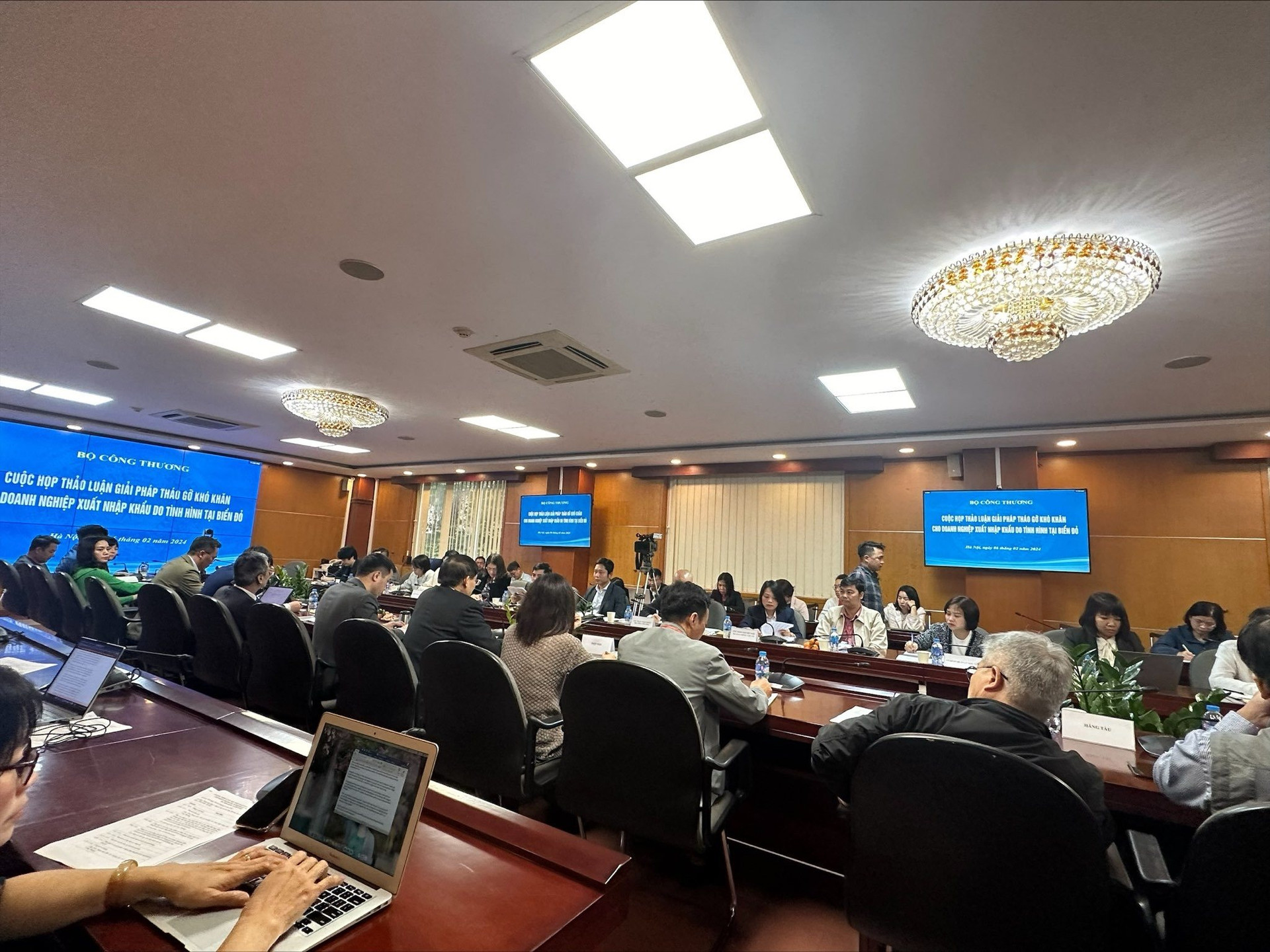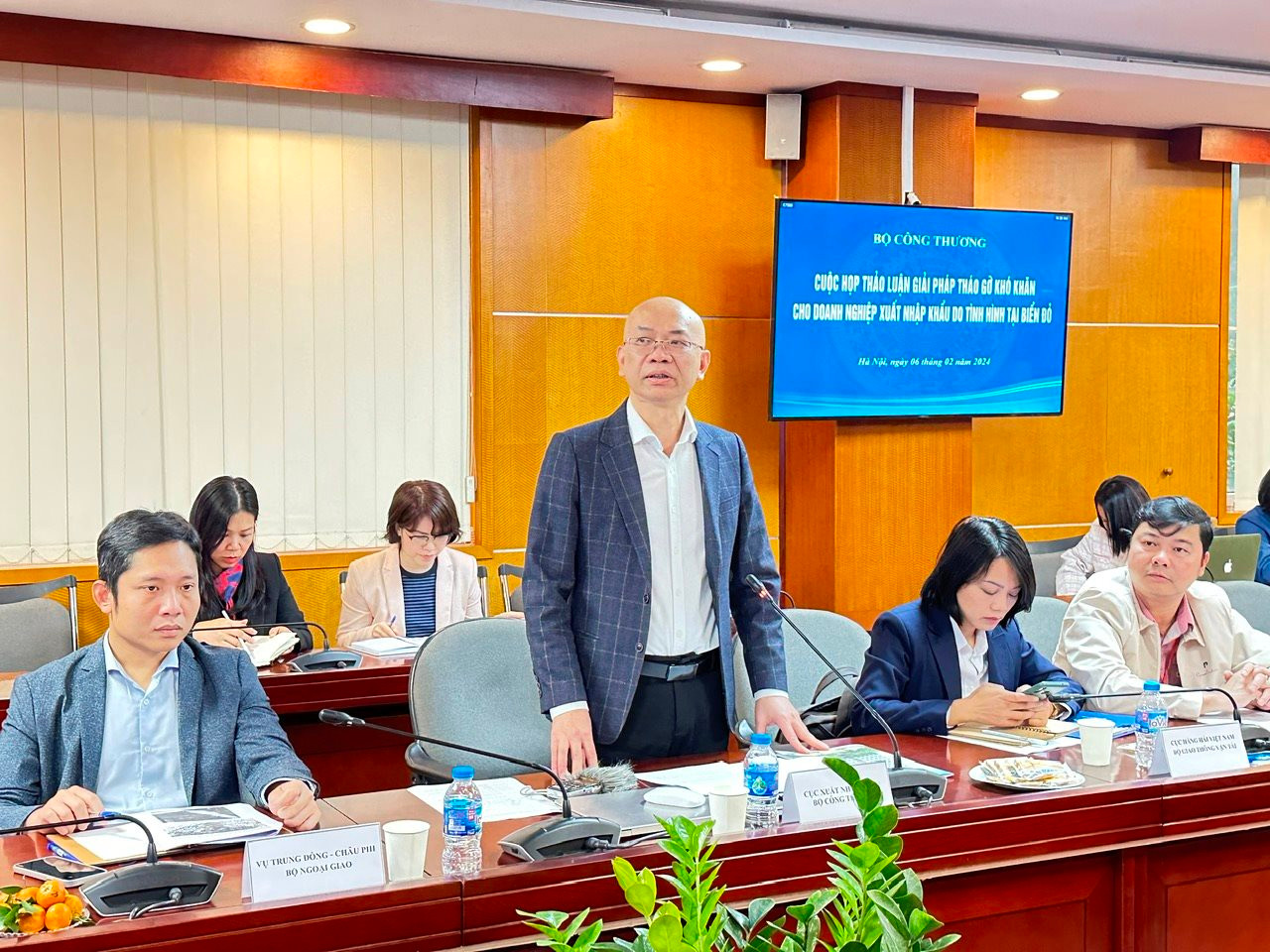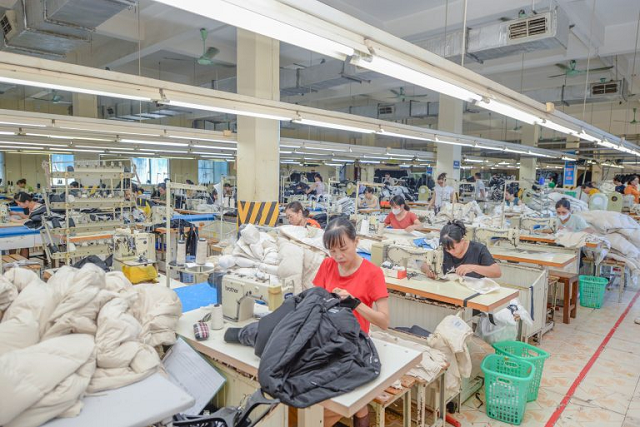
On February 6 in Hanoi, the Ministry of Industry and Trade, in collaboration with the Ministry of Transport and the Ministry of Foreign Affairs, organized a discussion on solutions to overcome difficulties for import-export enterprises due to the situation in the Red Sea.
At the beginning of the meeting, Mr. Tran Thanh Hai, Deputy Director of the Import-Export Department (Ministry of Industry and Trade), said that the Suez Canal is one of the strategic positions, linking the Mediterranean Sea with the Red Sea.
The Red Sea and the Suez Canal are shortcuts for ships to pass through ports in Europe, the East Coast of the Americas to ports in South Asia, Eastern African ports, and the Pacific Ocean ports. This is one of the most important global maritime routes, accounting for about 12% of the total global maritime traffic.
However, since the end of 2023, due to conflicts in the Red Sea area, many shipping companies have had to change routes, not passing through the Suez Canal but going around the Cape of Good Hope, making the ship’s journey last from 10 to 15 days longer than before.
Along with the restrictions on ships passing through the Panama Canal due to drought conditions (El Nino), the latest developments in the Red Sea have had a negative impact on the global maritime transport industry, as well as directly affecting Vietnam’s import and export activities, especially with the European and North American regions.

Mr. Tran Thanh Hai, Deputy Director of the Import-Export Department (Ministry of Industry and Trade), speaking at the meeting.
The Consequences of the Tensions in the Red Sea
The tensions and conflicts in the Red Sea have caused many adverse effects on Vietnam’s trade, especially significant impacts on import-export businesses and shipping companies.
Firstly, the transportation costs have increased. According to data from the Vietnam Maritime Administration, from January 2024, the shipping charges for containers by sea to the US and Canada have increased significantly compared to December 2023. The shipping charges to the West Coast increased from $1,850/container in December 2023 to $2,873 – $2,950/container in January 2024 (an increase of 55 – 60%); the shipping charges to the East Coast in December 2023 were $2,600/container, increasing to $4,100 – $4,500/container in January 2024 (an increase of 58 – 73%).
Regarding the shipping charges to the European market, they have also recorded a significant increase compared to December 2023. The shipping charge to Hamburg was $1,200 – $1,300 in December 2023, increased to $4,350 – $4,450 in January 2024. European businesses are believed to be the most affected because their supply chains rely heavily on the route through the Red Sea.
Secondly, shipments from Vietnam to other countries have begun to experience delays of at least one week. This has also disrupted the supply chain, delayed production for goods, especially during the late stage of 2023.
Thirdly, shipping companies are imposing additional surcharges due to the tensions in the Red Sea, putting pressure on the shipping costs borne by the shippers.
Fourthly, there is a shortage of large containers. This will affect countries with large export volumes such as China, Vietnam, Japan, South Korea, Thailand, as large containers return to Asia slowly.
Fifthly, there have been shortages of goods and disruptions in the supply chain in some areas. Finally, the above-mentioned cost increases may further pressure inflation.
Solutions to Overcome
At the same meeting mentioned above, representatives of the Ministry of Industry and Trade also proposed some solutions to help businesses and shipping companies overcome the difficulties they have been facing recently.
Firstly, Mr. Tran Thanh Hai, Deputy Director of the Import-Export Department (Ministry of Industry and Trade), said that it is necessary to stabilize freight rates and transportation charges. Accordingly, shipping companies need to strictly comply with the regulations of the law, especially the regulations on listing and publishing freight rates. Mr. Hai emphasized not to impose fees or surcharges without basis.
Secondly, Deputy Director of the Import-Export Department (Ministry of Industry and Trade) suggested that there should be a plan for diverting goods and alternative routes. In addition to the current routes, export-import businesses to Europe can consider alternative routes, such as rail routes. Or they can use a combination of multiple transportation modes such as waterways, road transport, air transport, etc.
Thirdly, Mr. Tran Thanh Hai recommended that businesses need to diversify their sources of supply for goods.
Fourthly, the Deputy Director of the Import-Export Department also noted that in contract negotiations and insurance contracts, businesses must ensure that transportation contracts include terms for force majeure situations and compensation in case of risks.
Fifthly, Mr. Tran Thanh Hai also suggested that businesses need to enhance cooperation, exchange information, evaluate the situation, and respond to future situations.
Finally, the Ministry of Industry and Trade also proposed that businesses should proactively develop prevention plans to minimize risks, losses, and damages from trade and international cargo transportation accidents.
From the Ministry of Transport, Ms. Nguyen Thi Thuong, representative of the Vietnam Maritime Administration, said that the Ministry is committed to implementing all solutions to ensure continuous operations at seaports for ships as quickly as possible. For shipping companies, the representative agency recommended that shipping companies maintain additional maritime transport services, ensuring the availability of ships and empty containers to meet the scheduling and export-import demands; strictly comply with the regulations on freight rates and surcharges.
Similarly, Mr. Vu Son Tung – Deputy Head of the Middle East-Africa Department (Ministry of Foreign Affairs) informed that they will closely monitor the situation and possible developments in the near future; study feasible and best alternative transport routes, provide information to businesses. Especially, it is necessary to focus on stabilizing freight rates and transportation charges. Shipping companies must comply with the rules on freight rates, not impose fees or surcharges without basis. Implementing diversification of goods sources and alternative routes, etc.














